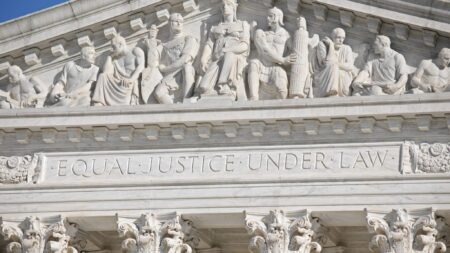
An Opinion By Bill Britt
The special session was simply a partisan exercise of raw political power that laid waste to justice and fairness.
In the recent special session, justice, fairness and the rule of law were at the heart of the debate over redrawing a new congressional map. What was missing from the proceedings was a willingness from the Legislature’s Republican supermajority to act justly or fairly.
The United States District Court for the Northern District of Alabama and the United States Supreme Court found that Alabama likely violated Section 2 of the Voting Rights Act when it drew congressional district maps in 2021.
The federal district court ruling held “that Black Alabamians are sufficiently numerous to constitute a voting-age majority in a second congressional district” and “Black voters have less opportunity than other Alabamians to elect candidates of their choice to Congress.” The Supreme Court and the district court agreed that the remedy was to redraw the 2021 maps to provide two minority-majority districts that gave fair representation to Black voters in the state.
The Republican-controlled Legislature acted in clear defiance of the court directive substituting its own will over that of the juries who had ruled against them. The court did give the lawmakers an opening for mischief when it ordered the Legislature to draw two majority Black congressional districts or “something quite close to it.”
The imprecise language of the phrase “something quite close to it” gave the state’s Republican supermajority an opening for one more chance to create a map that would tilt the playing field in the GOP’s favor. Another development was Associate Justice Brett Kavanaugh’s partial descent in Allen v. Milligan, which gives Republicans hope for a reversal of fortune. While joining the majority in ruling against Alabama, some believe Kavanaugh left an opening to reverse himself if the court re-hears the matter.
Attorney General Steve Marshall is hungry to test this theory after being rudely chaste in his previous outing before the high court. Marshall, once a Democrat, contemplates a win as an opportunity to polish his conservative credentials for a future run for higher office.
When the patina is stripped away, the special session was simply a partisan exercise of raw political power that laid waste to justice and fairness.
With arrogance and blind ambition, the supermajority rallied behind its partisan flag to disregard Alabama’s Black citizens, disrespect the United States Supreme Court, and display to the nation that in the cradle of the Civil Rights movement, sometimes the arc of history bends backward, despite Dr. King’s declaration.
Both chambers of the Legislature began each day of the special session with a Christian prayer and the Pledge of Allegiance. Animating true faith, the Pledge and the United States Constitution are the pulse of justice. Inherent in the idea of justice is a concept of fairness to treat others justly despite personal desires or bias.
The Republican House and Senate members marshaled their superior numbers to disenfranchise Black voters in 2021, as the court found in Allen v. Milligan. It did so again this past week with a wink and a nod to one member of the high court in hopes that the cleverly drawn new map will convince Kavanaugh to change his vote on the off chance SCOTUS hears the case again.
However, such wishful thinking should be tempered by Kavanaugh’s opinion on statutory stare decisis. In the Alabama voting case, Kavanaugh in his concurrence explained that precedent holds more weight when the court is interpreting statutes passed by Congress, as opposed to solely interpreting the Constitution. But perhaps cynically, the right wing of the Republican Party sees, too, that the current courts seem prone to changing its mind at will and without precedent.
Of course, the GOP-led Legislature reasoned in 2021 that the court now favored its side and would wipe away the last vestiges of the hard-won Voting Rights Act as Chief Justice John Roberts intoned in his majority opinion.
Alabama, Roberts said, was “attempting to remake our §2 jurisprudence anew” by arguing that a race-neutral benchmark is a necessary political process when deciding what constitutes “equally open” to Black voters. Roberts found Alabama’s “new approach to §2 compelling neither in theory nor in practice.”
Will the chief justice and his majority colleagues find Alabama’s noncompliance equally galling?
The Legislature is full of decent, intelligent women and men on both sides of the aisle, so why this power grab? Undoubtedly, two Black and five white congressional districts would not negatively impact the state’s standing in Congress. Would we not, as a people, be better served by equal representation for all citizens?
Some will see the actions of Republican lawmakers as racist; others will see partisanship. In reality, it’s both by degrees.
During the special session, reapportionment co-chair Sen. Steve Livingston, R-Scottsboro, revealed that he had spoken with U.S. Speaker of the House Kevin McCarthy, R-California, about the redistricting process. “He [McCarthy] said, ‘I’m interested in keeping my majority,” Livingston said. “That was basically his conversation … he’s just telling us to do what we can do. We did the best we could,” according to the Alabama Reflector.
This interaction with McCarthy shows Republican legislators acted to benefit the national party and thus acted with partisan intentions.
Republicans have enacted laws protecting Confederate monuments and there are those who would whitewash Black history under a so-called “divisive concepts” law. Both are playing to racist appetites.
I do not believe for a second that Speaker Nathaniel Ledbetter or Sen. Pro Tem Greg Reed are racist, but they are partisan. The court in its order didn’t anticipate blatant partisan disobedience, but that is what happened at the Statehouse. In full view of the world, Alabama’s Republican lawmakers showed what is wrong with politics in our state and how the ugly truth behind soft bigotry and white power dynamics still holds sway in what was once known as the Heart of Dixie.
What is ultimately disturbing, disheartening, and threatening to democracy is a willingness to deny justice and fairness when the choice is presented.
To be charitable, the efforts by Republicans may have been an overzealous attempt to preserve incumbent seats, but their brazen actions, however earnest, contradict the plain truth of the court’s ruling.
The sword of justice must swing swiftly to correct the state’s disobedience and the shield of the law should be raised quickly to protect Black Alabamian’s voting rights.
The best outcome would have been for the Legislature to have approved two majority-minority districts as the court instructed. They did not.
Now, the only reasonable cure is for the courts to draw the map in a way that honors justice, fairness, and the rule of law.


